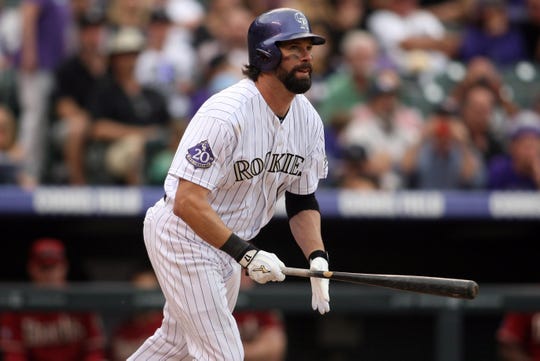Baseball Hall of Fame debate: Rockies icon Todd Helton faces Coors Field stigma
Todd Helton was the cornerstone of the Colorado Rockies franchise for 17 seasons.
He spent his entire major league career (1997-2013) in Denver, earning trips to the All-Star Game five times and the postseason twice. He was a consistent threat both with the bat and glove – winning the Silver Slugger Award four times and the Gold Glove three times.
Helton was one of baseball's most prolific hitters during his era, but his Hall of Fame candidacy will likely face the same roadblocks as his former teammate Larry Walker did during his 10 years on the ballot – playing half his career in the friendly confines of Coors Field.
Fair or not, Helton still finished his career with an impressive .316/.414/.539 slash line, 369 homers, 1,406 RBI and a 133 adjusted OPS+. Had his later years not been limited because of back problems, Helton, who retired with 2,519 career hits, may have been able to reach the 3,000-hit plateau.
Helton is entering his third year on the Baseball Hall of Fame ballot and trending upwards. But will it take another seven years to get enshrined in Cooperstown like Walker, or will he take a different path?
Todd Helton spent 17 years in the majors with the Colorado Rockies before retiring after the 2013 season. (Photo: Chris Humphreys, USA TODAY Sports)
Case For
Helton was one of most feared hitters – and not only at Coors Field – from the instant he broke into the majors.
Beginning his rookie season in 1998, Helton put together a remarkable 10-year stretch that stacks up with the best of sluggers during that era. Over the next decade, he posted a slash line of .332/.432/.585 while averaging 30 home runs and 108 RBI. And after adjusting for playing home games at Coors Field, Helton still had a 144 OPS+ during that span.
He is also one of seven hitters in major league history to post a .300/.400/.500 slash line in a career spanning at least 9,000 plate appearances and finished with more walks (1,335) than strikeouts (1,175). The six who have done it before Helton are all in the Hall of Fame: Babe Ruth, Ted Williams, Lou Gehrig, Rogers Hornsby, Jimmie Foxx and Stan Musial.
It should also be noted that Helton's career .855 OPS away from Coors Field is higher than the career road OPS of many Hall of Famers, including Dave Winfield (.841), Eddie Murray (.838), Tony Gwynn (.835), Al Kaline (.827), George Brett (.825) and Andre Dawson (.806).
Lastly, Helton was a two-way player. Defensively, he led the NL in assists four times, turned the most double plays six times and led the league in fielding percentage six times on his way to three Gold Gloves. As a first baseman, his 1,726 career assists are the second-most in major league history and his 2,038 double plays turned are the third most.
Case Against
Let's face it, the fact that Helton spent half of his playing career at Coors Field will be a detriment to his case. Look no further than Walker's path to Cooperstown – it took Walker all ten years on the ballot to get 75% of the votes.
Just how did that mile-high altitude benefit Helton, as critics like to point out? At home, he posted a .345/.441/.607 slash line and hit 227 of his 369 career home runs at Coors. On the road, he slashed .287/.386/.468. On paper, it's a stark comparison, but not a complete picture of his career.
Helton also played in era when offensive numbers were inflated. Aside from the monster 2000 season, he only led the league in one major statistical category (.445 OBP in 2005) over his 17 seasons. And he's only got one top 5 finish in the NL MVP balloting to show for it when he finished fifth in 2000.
Voting Trends
This is Helton's third year on the ballot and he is significantly trending upwards.
In 2019, he received a respectable 16.5% in his first year of eligibility on a crowded ballot that included four Hall of Famers – Mariano Rivera, Edgar Martinez, Roy Halladay and Mike Mussina. He followed with a significant boost in 2020 with 29.2%
Of the 133 ballots from BBWAA members as of January 13 entered into Ryan Thibodaux's Hall of Fame Tracker, Helton has changed the minds of 24 minds from last year to this year, raising his support to 54.2% this year. A player needs 75% of the vote to get inducted.
Consensus
While Helton likely won't get in this year, he's got a promising future. Helton has changed 24 minds of voters from last year to this year. According to his Hall of Fame Monitor — a metric created by sabermetrician Bill James where a score over 100 means a player is more likely to be voted in – his score of 175 is way over the mark.
Plus, Walker's enshrinement in 2020 should only help Helton's case.
Source: Read Full Article

